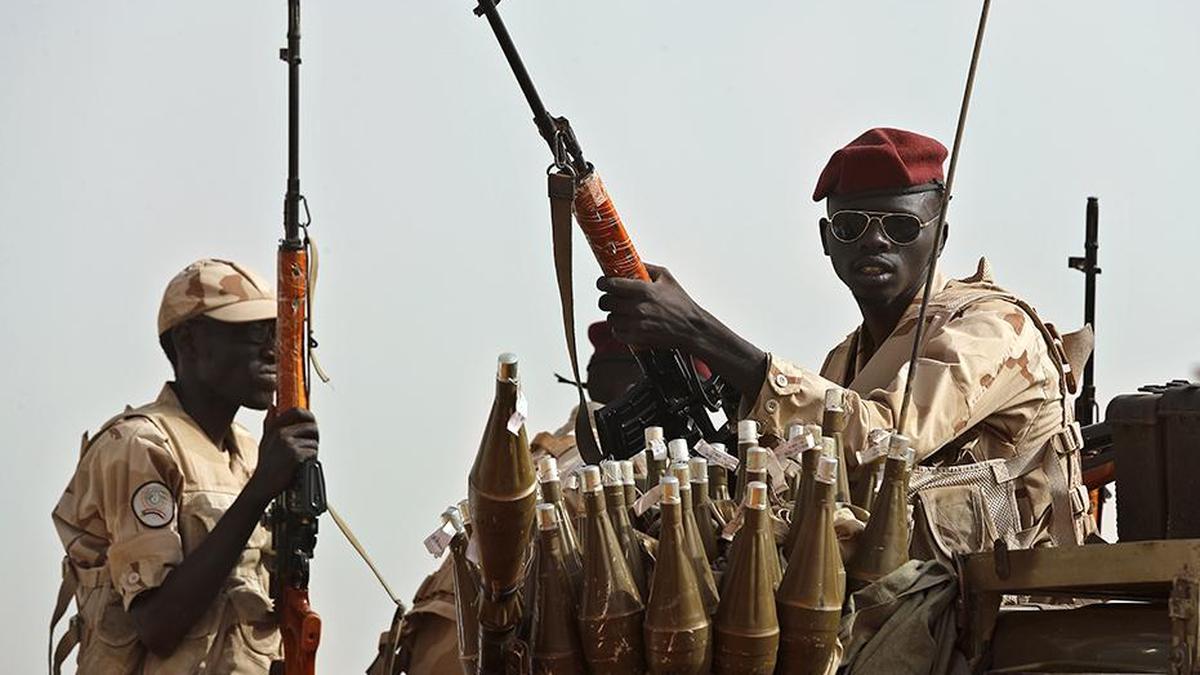File picture of Sudanese soldiers from the Rapid Support Forces (RSF) unit, led by Gen. Mohammed Hamdan Dagalo, the deputy head of the military council, secure the area where Dagalo attends a military-backed tribe’s rally, in the East Nile province, Sudan.
| Photo Credit: AP
‘Women and girls are being raped, people being mutilated and killed — with utter impunity,’ said Tom Fletcher, the UN’s top relief official, late last month about the takeover of El-Fasher, in Sudan’s Darfur, by the paramilitary Rapid Support Forces (RSF). After a 500-day-long battle, the RSF moved house to house in El Fasher targeting civilians. The city, already gripped by hunger, “has descended into an even darker hell,” Mr. Fletcher told the Security Council on October 30.
The plight of Darfur is only a slice of the tragedy of Sudan, which plunged into a deadly civil war between the Army and the RSF in April 2023. More than 12 million people are estimated to have been displaced. More than 61,000 people are estimated to have been killed. While both sides are accused of committing atrocities, the RSF, commanded by Mohamed Hamdan Dagolo, was particularly blamed by rights organisations for its genocidal campaigns.
The RSF’s roots go back to the notorious Janjaweed (literally, Spirit of the Horse), an Arab supremacist militia which was once backed by former Libyan leader Mohammer Qaddafi. When Sudan fell into a civil war in the 1990s, the regime of Omar al-Bashir backed Janjaweed, who unleashed brutal violence in Darfur. They beat back the rebels but were accused of carrying out genocidal acts against the Fur, Masalit and Zaghawa peoples of the region — all African communities. This period also saw the rise of Mr. Dagolo (popularly known as Hemedti, or Little Mohamed) through the ranks of the Janjaweed. When Mr. Bashir decided to form the RSF in 2013, he picked Hemedti as its commander.
Within years, with Hemedti’s quick rise as a confidant of Mr. Bashir, the RSF came directly under the President’s command. Despite calls for its integration with the regular Army, the RSF remained autonomous. In the following years, the RSF acted as Mr. Bashir’s feared private army. It faced allegations of torture, rape and mass killings.
When mass protests shook Sudan in 2019, Mr. Bashir turned to the RSF once again. In June, Hemedti’s forces attacked peaceful protesters in Khartoum. Hundreds were killed. Bodies turned up in the Nile. But even the RSF could not quell the revolutionary spirit of the protesters. When the Army and the RSF realised that continuing agitations threatened to take away the privileges they enjoyed under the regime Mr. Bashir built, they decided to sacrifice the head of the regime to protect themselves.
Mr. Bashir was ousted from power. For Hemedti, it was an opportunity to formalise his influence in Sudan. For years, he was a warlord commanding a paramilitary force. Now, he became Number 2 in the transition government.
Two Generals
The Army, commanded by Gen. Abdel Fattah al-Burhan, and the RSF, stood hand in hand in halting Sudan’s transition to democracy in 2021. But the internal contradictions came to the surface once the Army seized power. Gen. Burhan, wary of Hemedti’s ambitions, wanted to integrate the RSF into the regular Sudanese Army. The militia wanted a 10-year timeline for integration, while the military government insisted it happen in two years. As a power struggle broke out between the Generals, the RSF was deployed in Khartoum, the capital, on April 11, 2023. Fighting erupted soon after, plunging the whole country into a prolonged civil war.
Today, the Sudanese Army controls most of the country, including Khartoum, and Port Sudan, the Red Sea city which is the de facto capital. The RSF’s stronghold is Darfur. With the fall of El Fasher in October, the Sudanese Army lost its last major territory in Darfur to the RSF.
The Sudanese government says the RSF gets backing from foreign powers, especially the UAE and the UAE-aligned factions in Libya. Egypt is believed to be backing the Army. The RSF has also formed a parallel government, which raised fears that the country could be fragmented further. As both sides dig in their heels, a lasting solution to Sudan’s conflict remains elusive.
Published – November 09, 2025 02:24 am IST
